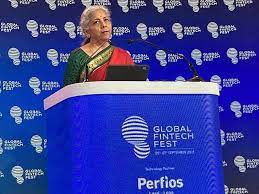Union Finance Minister Nirmala Sitharaman asked fintech companies to invest in cybersecurity and said that trust is very important
Mumbai:
India’s financial ecosystem has made a giant stride from being conventional to fintech-driven and the new solutions have helped it make more robust for financial inclusion, Union Finance Minister Nirmala Sitharaman said on Tuesday.
“There was a time when conventional financial activities were the backbone of financial ecosystem but today Fintech has become more robust and dynamic financial inclusion tool,” Sitharaman said addressing the inaugural session of Global Fintech Fest 2023 in Mumbai.
She delivered the inaugural address on the theme ‘Global Collaboration for a Responsible Financial Ecosystem: Inclusive, Resilient, and Sustainable’.
The minister touched upon some of the indicators that would further boost India’s financial ecosystem.
She noted the number of Demat accounts increased by 2.5 times from 4.1 crore in 2019-20 to 10 crore in 2022-23. Record number of mutual funds and SIPs are being registered, which are help in generating long-term wealth, with the monthly flow in the mutual fund industry reaching an all-time high of Rs 15,245 crore in July 2023. she added.
“A record number of mutual funds and SIPs are being registered which helps in generating wealth,” she said. “Top 30 cities of India are usually expected to be ahead in formal savings.
However, in the last four years, the share of cities beyond the top 30, in total mutual fund assets has grown from 15 per cent to 26 per cent. So it’s beyond 30 cities that are contributing to India’s financial ecosystem.”
“Instruments like SIPs are only democratising this wealth-creation opportunity. The government’s efforts in creating UPI democratised payments and Open Network for Digital Commerce (ONDC) is now doing it for e-commerce. Fintechs are driving more inclusion and creating their niche,” Sitharman added.
She said that drug mafias, the use of tax havens to roundtrip resources, and tax evasion are some of the threats attached to the financial ecosystem.
Later, speaking on crypto and the potential threat and opportunity attached to it, she reiterated India’s stance that it seeks global cooperation for regulation. “Unless you go for a global cooperation, you are not going to get a responsible financial ecosystem which can it regulate it as well,” she said.
India has maintained that any legislation for regulation for banning cryptocurrencies can be effective only after significant international collaboration on the evaluation of the risks and benefits. Crypto assets are currently unregulated in India. The government does not register crypto exchanges and it maintains crypto assets, by definition, are borderless and require “international collaboration”.
Sitharaman asked banks and financial institutions to ensure that their customers nominate heirs, which can help reduce the quantum of unclaimed money.
“I want banking system, the financial ecosystem (including) the mutual funds, stock markets… everybody to keep in mind that when someone deals with his (customer’s) money, the organisations will have to think about the future and ensure that they (customers) nominate their heir, give the name and address,” said Sitharaman.
As per a report, the banking system alone has over Rs 35,000 crore of unclaimed deposits, while the overall quantum of the unclaimed money is said to be more than Rs 1 lakh crore.
Income tax data released in August is the biggest signal of the wide-scale formalisation of the Indian economy, said Sitharaman.
Providing statistics, she highlighted “Each tax slab has seen a minimum of three-fold surge in tax filings. Maharashtra continues to be the leader in ITR filings.Some even achieved a nearly fourfold surge.In the northeast, Chhattisgarh, and J&K, ITR filing is up by two digits, which augurs well for the ecosystem.”
Workforce share in population will rise to 45% in 2047. Taxable workforce will also rise to 85.3% from current 22.5%, There will be 48.2 crore income tax filers in 2047, as opposed to 7 crores in FY23,” she said.
She asked fintech companies to invest in cybersecurity and said that trust is very important.

